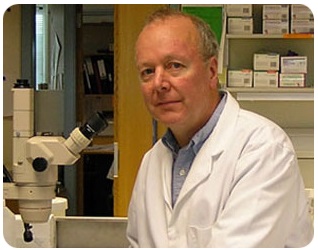 A few of the researchers and clinicians currently working with Rett syndrome
A few of the researchers and clinicians currently working with Rett syndrome
Professor Adrian Bird
Professor Adrian Bird: Adrian’s team discovered the ground breaking (and Rett UK funded!) reversal of Rett syndrome in mice in 2007. This piece of research, first published in Science, February 2007, has become the basis of many further studies into the MECP2 gene and its role in Rett syndrome. Find out about Adrian and his team’s current work here at The Welcome Trust Centre for Cell Biology in Edinburgh. Photo courtesy of Dietmar Klement – iStockphoto.com
Read about Dr Bird’s latest work here, developing a mini gene. They hypothesized that if the primary function of MECP2 is to form a bridge between DNA and NCoR then perhaps the other parts of the gene aren’t vital. They took the MECP2 gene and chopped off everything before the MBD and after the NID to create a shortened gene.
Professor Adrian Bird and Professor Stuart Cobb are part of the Gene Therapy Consortium researching gene editing and gene therapy as possible routes to a cure for Rett syndrome.
Professor Jeff Nuel: Jeff’s team work out of Baylor College of Medicine, Houston, Texas. Jeff also concentrates on MECP2 mutations in animal models and is looking to translate this research into therapeutic interventions for humans living with Rett syndrome. Jeff was also involved in the 2010 revision of the Rett syndrome diagnostic criteria, download the the paper here. Read more about Jeff Nuel’s latest work at Baylor here. His most recent paper The Changing Face of Survival in Rett Syndrome and MECP2 Related Disorders was published in June 2015.
Dr Adrian Kendrick and Dr Ana Abdala
Trial of Respiratory Support for Children & Adults with Rett Syndrome
The Bristol Rett syndrome researchers and their collaborators are seeking funding for a trial of respiratory support in patients with Rett syndrome aged 5-30 years.
Details of the project.
This project involves the physiology team from Bristol, consisting of Prof Julian Paton, Dr Ana Abdala and Dr Adrian Kendrick.
This would aim to assess the breathing overnight of perhaps 150 patients with Rett syndrome and then offering support overnight to those whose breathing is affected, to see if this can help to improve the well-being of the girls or women not only during sleep but also over the following day. In addition to answering this question, the trial (if it is funded) will also help us to refine the range of outcome measures to use in future trials, which would make it simpler and cheaper to conduct future clinical trials in Rett syndrome in the UK. We hope that medication will become available over the next couple of years that would help to stabilise the breathing of affected girls and women by day as well as by night and without having to have the patient hooked up to cumbersome equipment.
Taking part in the trial would take about 3 months but would (almost) all happen at home and would involve the initial assessment over 1-2 weeks followed, in those who enter the main study, by two periods of 4 weeks with 2 weeks between. It would be a major help for those taking part to be within striking distance of Bristol. More information to follow if funding is secured.



